By LISA EISENHAUER
In Baton Rouge, Louisiana, Our Lady of the Lake Regional Medical Center was experiencing a record surge of COVID-19 cases as the omicron variant of the coronavirus took hold in mid-January.
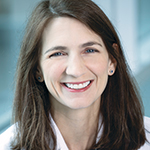
O'Neal
Dr. Catherine O'Neal, an infectious disease specialist and the hospital's chief medical officer, said the hospital was admitting 30-40 patients a day for COVID care. "We've never admitted that many COVID-positive patients before," O'Neal said.
Even with that pace, the hospital wasn't keeping up with demand. The medical center, one of the largest hospital in the state and in the Franciscan Missionaries of Our Lady Health System, was not accepting transfers of COVID patients in need of specialty care, as it normally would as a regional hub. It was running at capacity caring for those who presented at its own emergency rooms and clinics.
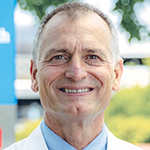
Koekkoek
In the Pacific Northwest, the PeaceHealth system was bracing for what was to come. Dr. Doug Koekkoek, chief physician executive for the Vancouver, Washington-based system, said projections showed the region was two or three weeks away from a peak in the latest surge.
"The models suggest that probably hospital volumes will be about 30% higher than we had with the delta peak," Koekkoek said. The system set records for COVID hospitalizations during that surge in late summer.

Murphy
In Cleveland, the staff at St. Vincent Charity Medical Center was catching its breath. The hospital and others across the city saw a spike in COVID patients in December that appeared to peak around Christmas. The governor sent in National Guard troops to help.
Janice Murphy, who moved from president and chief executive of St. Vincent to the same role for its parent Sisters of Charity Health System on Jan. 1, was hopeful that the worst of the surge had passed. "Even though we've had challenges with our staffing, we've been able to manage it internally and so we did not require the National Guard," she said.
More cases, less severity
As omicron moved in waves across the nation, the Department of Health and Human Services reported that total hospitalizations for COVID were hitting records. On Jan. 12, a new high was set at 151,211. The Centers for Disease Control and Prevention reported that on Jan. 10 the seven-day average for COVID admissions was at 20,269, up about 30% from a week before.
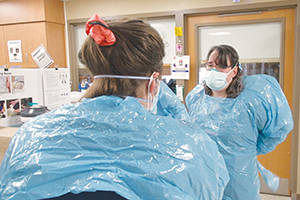
Nurse Abby Raye, left, and respiratory therapist Melissa Shaha don protective gear as they prepare to enter the rooms of patients with COVID-19 in the intensive care unit at HSHS St. Mary's Hospital Medical Center in Green Bay, Wisconsin. The Hospital Sisters Health System has seen record numbers of inpatients with the virus during the omicron surge.
Executives at Catholic health care ministries reported that the characteristics of the omicron spread did seem to be following trends seen in places like Cleveland where it hit early. They said more patients were falling ill with the virus than ever, but a lower percentage needed intensive care.
O'Neal said that at Our Lady of the Lake about 10% of COVID patients had been mechanically ventilated during the delta surge. Only about 5% of hospitalized patients with the omicron variant have been on ventilators. In addition, stays in this surge have been shorter, typically three or four days rather than the three or four weeks during the delta surge.
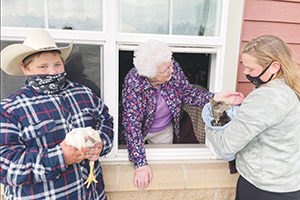
Children involved in the 4-H program bring animals to visit Ruth Carlson at her window at Mission Court, an assisted living facility that is part of the Benedictine Living Community – Ada in Minnesota. While COVID-19 was rapidly spreading at nursing homes across the country because of the highly contagious omicron variant, Benedictine as a system had seen relatively few new cases among residents through mid-January.
Unvaccinated at higher risk
Something that's unchanged from delta, the hospital executives said, is that the patients getting the worst cases of COVID are those who have not been vaccinated. When the Hospital Sisters Health System, which has hospitals in Illinois and Wisconsin, hit a record for COVID inpatients on Jan. 8, executives called a press conference to mark the "unfortunate milestone."
Of the system's 303 COVID inpatients, 76% were unvaccinated; of the 64 in intensive care units, 80% were unvaccinated.
Koekkoek said PeaceHealth's statistics would be similar. "This is still an epidemic of the unvaccinated, as far as who's in the hospital," he said.
Dr. Michael Elliott, chief medical officer at Avera McKennan Hospital & University Health Center in Sioux Falls, South Dakota, part of Avera Health, said in mid-January his system appeared to be in the early days of an omicron-fueled surge. He called the variant's spread "a little bit mind-boggling."
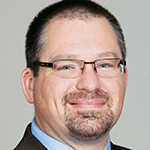
Elliott
Based on the rates of community spread and positive tests, the system, which spans South Dakota and reaches into pockets of neighboring northern plains states, was anticipating a spike in demand for COVID hospitalization in late January. But Elliott said there was little his hub hospital or Avera Health could do to make room for a surge of patients. He said Avera Health hospitals already were at capacity for inpatients based on available staffing.
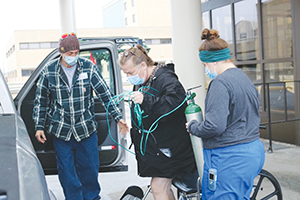
Ronda Morrison leaves HSHS St. John's Hospital in Springfield, Illinois, after being hospitalized there with complications from COVID-19. Morrison recorded a video crediting the hospital for saving her life and urging others to get vaccinated against the virus. She had not been vaccinated at the time she was hospitalized. The health system says most of the record number of patients it has been caring for during the omicron surge have been unvaccinated.
At Avera McKennan, he said, "there are many days when we have more people on the waiting list to come into the hospital than we have planned discharges."
Worker shortage worsens
As in the general population, omicron has sidelined many health care staffers. At Avera Health, hundreds of workers were out on sick leave because of the virus in mid-January. At Our Lady of the Lake, O'Neal said 130-140 "bedside team members" were out with COVID every day. She said the medical center, which is licensed for 800 beds, was unable to staff 60-70 of them because of lack of staff.
The COVID cases among staff were exacerbating the ongoing critical shortage of workers across the medical sector, the hospital executives said. The shortage is forcing extraordinary steps, including hiring unprecedented numbers of temporary workers from staffing agencies, delaying or limiting nonurgent surgeries and refusing transfers from hospitals that lack the specialists needed for severe COVID cases.
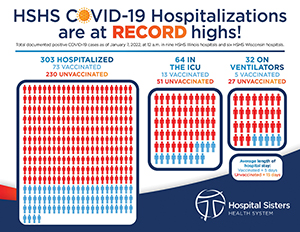
A graphic posted on social media by the Hospital Sisters Health System shares the breakdown between vaccinated and unvaccinated patients who are hospitalized for COVID-19. The system set new records for the number of hospitalized patients with the virus in January as the omicron variant spread.
O'Neal said in mid-January her hospital had a request in for assistance from the military, which had sent in reinforcements over the summer. Back then, Louisiana was experiencing a COVID spike from delta that was worse than in most other parts of the nation. She was uncertain about whether the hospital would get help again because omicron and the staffing shortage have created a widespread need "and now everybody's sort of clamoring for that same pot of people."
Meanwhile, the executives said that their diminished staffs are wrung out by the demands of the pandemic. Early on, Elliott noted, Avera cut back on services and patients were reluctant to come in for some procedures. That allowed the system to shift workers in outpatient facilities into hospital care.
"We're now almost three years into this and everybody's extremely tired," he said. "We're crazy busy in the clinics and the acute care settings so we don't have folks that we can float from those areas to the hospitals."
If there's a bright side to the latest COVID surge, the hospital executives said it might be that their staffs are now so familiar with the virus that they have learned how to check its spread in their facilities and how to best care for patients. Murphy credited the sharing of information and cooperation within the health care sector for rapid advances in COVID care.

St. Vincent Charity Medical Center, part of the the Sisters of Charity Health System, joined several other providers in a plea to the public issued in this full-page ad in The Plain Dealer newspaper in mid-December.
"I would say now our clinical teams are really experts at the protocols, the medication, the way that we manage these patients, the way that we work to keep them off of ventilators," she said.
Scarce medication
One factor that could enhance that treatment but that is out of their control, the health care executives said, is a larger supply of some medications, especially the one monoclonal antibody therapy that has proven effective against omicron. Elliott said systemwide Avera Health was getting 30-40 doses per week of that one-dose-per-patient therapy when it could use hundreds. "It hardly scratches the surface," he said.
The executives said the antiviral pills made by Pfizer that got approval for emergency use from the Food and Drug Administration in December for mild-to-moderate cases of COVID were in equally short supply.
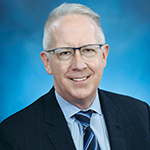
Shelton
Dr. Marc Shelton, senior vice president and chief clinical officer for HSHS, noted that the allocation for central Illinois was about 200 pill packs per week. "That can be awesome for the 200 people that need it and get it but we're seeing thousands of people get this disease right now so that's a drop in the bucket," he said.
Public appeals go on
Across the country, health systems and clinicians continue to urge the public to get vaccinated, wear masks, wash their hands and practice social distancing. HSHS posts regular updates on its social media channels about the rates of unvaccinated patients in its COVID units. Sisters of Charity and several other health systems bought a full-page ad in The Plain Dealer, a Cleveland newspaper, in mid-December with a simple plea: Help. The ad urged people to get vaccinated and follow standard COVID precautions. "We need you to care as much as we do," it said.
Hospital uses algorithm to staunch inequity in COVID treatment
The scarcity of some treatments for COVID-19 patients means that doctors have to make tough decisions.
For example, in the first week of January, Our Lady of the Lake Regional Medical Center in Baton Rouge, Louisiana, got an allotment to treat about 30 patients with a monoclonal antibody medication that has been shown to be effective against the omicron variant. The next week, the hospital was expecting about 60 doses, still far from the need in a region where hundreds of patients were hospitalized with the virus.
"It's not adequate for the number of people we're diagnosing and the number who would benefit," said Dr. Catherine O'Neal, the hospital's chief medical officer.
O'Neal said that having precious medications in such limited supply creates the potential for inequity and favoritism. "Unless you try to be just as random as possible in who you treat, you're going to end up treating the people who know about the supply first or who know somebody who knows about the supply," she said. "It's caused quite a difficult decision matrix for our physicians to have to follow."
To rectify that, and ensure the doses go to patients with the most to gain from the treatment, Our Lady of the Lake counsels doctors to use an algorithm that factors in a patient's age, preexisting conditions, immune system suppression and other characteristics. For those deemed at high risk of poor COVID outcomes, the doctors are urged to use whatever medications are on hand and appropriate.
O'Neal said Our Lady of the Lake hopes the algorithm gets doctors past any compulsion to hold back scarce medications for fear that an even more vulnerable patient will need them. "You start to play more mind games with yourself, and it becomes inequitable," she said.
— LISA EISENHAUER
Benedictine stays vigilant as COVID spikes elsewhere in long-term care settings
A report released in mid-January by the American Health Care Association and the National Center for Assisted Living pointed to an alarming spike in new COVID-19 cases at nursing homes.
On Dec. 19, the report said, there were 4,361 COVID cases among nursing home residents and 5,919 among staff. On Jan. 9, cases among residents had jumped to 32,061 and among staff to 57,243.
The report urged that public health officials prioritize long-term care facilities for testing and treatment and provide workforce support as the facilities struggled to find staff.
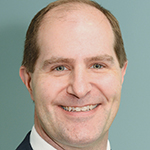
Carley
Jerry Carley, president and chief executive of Minneapolis-based Benedictine, said the system was seeing an uptick in COVID cases in early to mid-January at its 35 senior living communities in the Midwest as the omicron variant spread but nothing like what the report showed on a national scale.
Among Benedictine's 4,000 residents in its independent living, assisted living and skilled nursing units, Carley said there were 30 positive COVID cases; among its 4,000 staff, about 160 were off because of the virus.
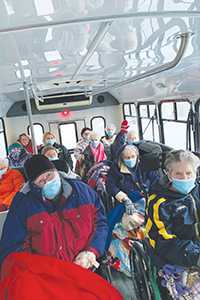
A group of masked residents of the Benedictine Living Community-Ada in Minnesota venture out for a bus tour of Christmas lights. The community has eased up on some restrictions that were in force early in the pandemic but continues to follow masking and other safety protocols to prevent the spread of COVID-19.
The numbers were far from the peak for the system, which happened in fall 2020 before vaccines were available. At that time, 150-160 residents of its continuum of care facilities were testing positive on any given day. Carley credited a high vaccination rate and continued adherence to masking and other COVID protocols for preventing subsequent outbreaks.
Benedictine is keeping a close watch on how omicron progresses through its continuum of care communities, he said. If need be, the system will implement additional safety precautions to lower the infection risk for all its residents.
Carley said of the lockdown that eldercare communities endured early in the pandemic: "It was horrible," adding, "It is our hope we don't return to that level of restrictions due to this latest surge." The system had eagerly reopened its doors to residents' loved ones as soon as it got the go-ahead from public officials.
Even with visitors back in and the virus mostly kept out, Carley said Benedictine is not yet back to pre-COVID operations. For one thing, its census in skilled nursing facilities is down about 10%, largely because of a lack of staff.
In Minnesota, the staff shortage has been so severe that it has backed up the pipeline for hospital discharges to skilled nursing facilities. Late last year, 75% of nursing homes in the state were restricting admissions and 25% had complete bans.
To address the shortage of skilled nursing beds, Minnesota started a "hospital decompression initiative" with four facilities, three of them part of Benedictine. The state is providing National Guard troops and agency workers and the nursing homes are providing space for patients who are rehabbing from hip surgery and other medical conditions other than COVID.
Carley said the initiative has helped hospitals move hundreds of patients to nursing homes, opening up needed inpatient beds for COVID and other patients. The initiative was set to end on Dec. 31 but was extended through February. He expected another extension, as Benedictine and other skilled nursing and long-term care providers continued to recruit staff.
— LISA EISENHAUER